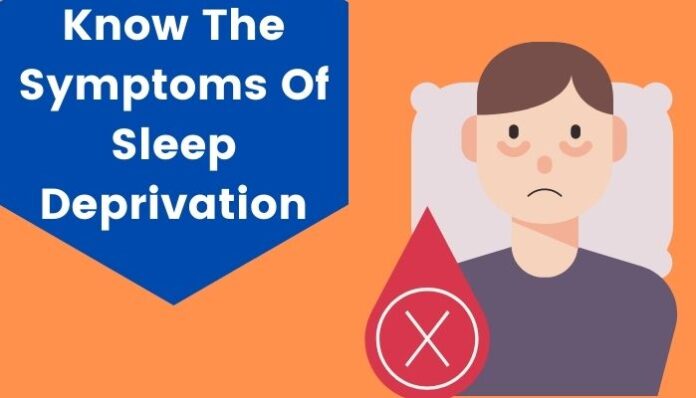Sleep deprivation may make you cranky, tired, and muddled. The symptoms of sleep deprivation could be dangerous, even life-threatening. Sleep deprivation may affect your sex life, memory, health, appearance, and even you will be unable to lose weight.
The CDC recommends at least 7-8 hours of sleep every day to remain healthy and to avoid sleep deprivation headaches.
Sleep Deprivation Causes
There could be an array of reasons that may hamper your quality of sleep. Examples include:- Work shift
- Too much work pressure (need to meet deadlines frequently)
- A noisy environment
- Not the right temperature of your room
- Usage of electronic devices just before bedtime
- Healthcare conditions such as depression, sleep apnea, or chronic pain
- Need to care for another person, especially at the night
- Chronic fatigue syndrome
- Prolonged pain
- Substance abuse
- Depression
- Anxiety
- Bipolar disorder
- Schizophrenia
- Obesity
- Sleep apnea
- Bruxism or grinding the teeth
- Narcolepsy
Lack Of Sleep Symptoms
1. Central Nervous System
Sleep deprivation may affect your mental abilities and emotional state adversely. You may become susceptible to mood swings. Lack of sleep may affect your decision-making capacity and creativity. You can also start hallucinating things if you suffer from prolonged sleep deprivation. A lack of sleep can also trigger mania in some people, especially those who are suffering from bipolar disorder. Other psychological risks could be:- Impulsive behavior
- Anxiety
- Depression
- Paranoia
- Suicidal tendency
2. Immune System
Your immune system produces infection-fighting substances like antibodies and cytokines when you sleep. These substances safeguard your body against foreign particles, such as bacteria and viruses.Certain cytokines may improve the efficiency of your immune system and help your body against various diseases. Due to sleep deprivation, your body can’t produce these substances. Without adequate sleep, your body isn't able to ward off foreign invaders. So, it may take a longer time for recovery. Long-term sleep deprivation will uplift your risks of getting diseases like diabetes mellitus and heart disease.
3. Respiratory System
Your sleeping habits and the respiratory system go hand in hand. A nighttime breathing disorder called obstructive sleep apnea (OSA) may disrupt your sleep and reduce sleep quality.When you wake up at night, you may become more prone to respiratory infections like the common cold and flu. Lack of sleep can cause chronic lung disease.
4. Digestive System
To maintain your weight, you need to keep the focus on your sleep pattern along with diet and exercise. Sleep impacts the levels of two hormones, leptin, and ghrelin that are responsible for hunger cravings and fullness.Leptin signals your brain that you have eaten adequate foods. Without sufficient sleep, your brain lessens leptin and raises ghrelin, which is an appetite stimulant. The imbalance of these two hormones may lead to night cravings and that’s why some people used to eat later in the night.
Sleep deprivation also makes you tired during exercise. If you don’t perform physical activities regularly, you will gain weight, as you are not burning adequate calories and not building muscle mass.
Your body may produce insulin after your meal due to sleep deprivation. Insulin reduces the level of sugar (glucose) in your blood. Sleep deprivation makes you insulin resistant and minimizes the body’s tolerance for glucose. As a result, you may suffer from diabetes mellitus and obesity.
5. Cardiovascular System
Sleep deprivation may affect your heart and blood vessels. It will also increase the levels of your blood sugar, blood pressure, and inflammation. This also plays a crucial role in your body’s capacity to heal and repair the blood vessels and heart. People who are having sleep deprivation may suffer from diseases like heart attack, stroke, and other heart ailments.6. Endocrine System
Your sleep controls hormone production. To produce testosterone, you need at least 3 hours of continuous sleep. Your hormone production may get hampered if you wake up at night.Sleep deprivation may also affect growth hormone production, especially in children and adolescents. These hormones monitor growth functions and also repair cells and tissues. Though the pituitary gland releases growth hormone each day still, you need proper sleep and exercise to release this hormone.
Prevention
1. Behavioral And Cognitive Treatments2. Relaxation Techniques: meditation, breathing exercises, etc. will reduce tension. Audio recordings and sleep apps are also beneficial for your sleep.
3. Cognitive-Behavioral Therapy: CBT may help a person in lessening his/her limited sleep.
4. Medications
Some medications may help you in treating your sleep problems.
- Diphenhydramine (Benadryl)
- Doxylamine (Unisom)
- Zolpidem (Ambien)
- Butabarbital (Butisol)
- Temazepam (Restoril)
Home Care Strategies
Apart from medications, you may consider the below-mentioned things to improve your sleep quality.- Every day go to your bed and at the same time, even on the weekends
- Don’t eat anything at least 2–3 hours before bedtime
- Perform regular physical activities during the day
- Make a soothing environment by keeping your bedroom quiet, dark, and cool.
- Switch off all electronic devices and keep them in another room/place
- Restrict your alcohol and caffeine consumption, especially close to bedtime
- Avoid tobacco use
- Use a mouth guard to manage bruxism



